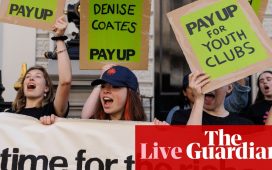US inflation rises to 2.7%; markets still expect Fed rate cut next week
US inflation has risen slightly, in line with economists’ expectations, and are unlikely to alter expectations of an interest rate cut next week.
The consumer prices index rose at an annual rate of 2.7% last month, up from 2.6% in October. On a monthly basis, headline CPI rose by 0.3% in November, versus 0.2% in October.
The core rate of inflation, which excludes foods and energy, stayed at 3.3%, also as expected. On a monthly basis, core CPI rose 0.3% in November, the same gain as in October.
Inflation still remains above the Fed’s targeted goal of 2%, but many economists and investors are betting that the Fed will cut rates next Wednesday by a quarter-point, which would bring them down to 4.25% from 4.5%.
Key events
Closing summary
The rate of US inflation barely moved in November, the last piece of major economic news before the Federal Reserve weighs whether to cut interest rates for the third time this year at its meeting next week.
Prices rose 2.7% in November compared with a year before, according to consumer price index (CPI) data released by the Bureau of Labor Statistics (BLS) on Wednesday measuring the prices of select goods and services. The core inflation rate, which removes the volatile food and energy industries from the data, held steady last month, at 3.3%.
The annual rate of inflation still remains above the Fed’s targeted goal of 2%, but many economists and investors are betting that the Fed will cut rates on 18 December. Expectations place a potential cut at a quarter-point, which would bring rates down to 4.25% from 4.5%.
Inflation peaked at 9.1% in June 2022, a 40-year high, and has gradually come down over the last two years. The lowest inflation has been since then was 2.4%, in September, though it ticked up to 2.6% in October.
The Supreme Court has granted permission for two car lenders to appeal a landmark ruling on motor finance commission payments that has left firms fearing a potential £30bn compensation bill.
The decision gives Close Brothers and MotoNovo owner FirstRand a chance to overturn a decision by the court of appeal, which in October said that paying “secret” commission car dealers – without disclosing the sum and terms of that commission to borrowers – was unlawful.
The court of appeal decision went beyond existing City regulation and an ongoing Financial Conduct Authority investigation into harms caused by now-banned discretionary commission arrangements (DCAs). It also opened the door to a fresh flood of claims that ratings agency Moody’s says could now cost lenders up to £30bn.
News that the supreme court had accepted the case bolstered motor lenders’ shares. Close Brothers jumped as much as 8% while Lloyds Banking Group rose by 4%, and Barclays climbed by 1.6%.
Other other main stories:
Thank you for reading. Take care! – JK
The Financial Conduct Authority has welcomed the “swiftness” of the Supreme Court’s decision to hear an appeal against the Court of Appeal’s judgment in three recent motor finance cases involving Close Brothers and FirstRand Bank.
We previously wrote to the Supreme Court asking it to decide quickly whether it will give permission to appeal and, if it does, to determine the substantive appeal as soon as possible. This is because of the potential impact of any judgment on the motor finance market and the many consumers who rely on it. We are considering whether to formally intervene in the case to share our expertise to assist the Court on the substantive appeal.
We have proposed extending the time firms have to respond to motor finance complaints where a non-discretionary commission arrangement was involved. We will take the Court’s decision to hear the appeal into account as we decide on the outcome of our consultation. We thank everyone that responded to the consultation and will publish our policy statement by 19 December 2024.
The UK’s Supreme Court appeal hearing in the motor finance case will take place before mid-April.
The Supreme Court has not yet set a date for the hearing, but said it would take place by the end of the Hilary legal term which ends on 16 April 2025. That could lead to a decision by the autumn, our banking correspondent Kalyeena Makortoff reports.
The Supreme Court has granted permission for Close Brothers and FirstRand to appeal a landmark court of appeal ruling from October that has left UK lenders fearing a £30bn compensation bill.
It means there is a chance to overturn the ruling, which had determined that paying a “secret” commission to car dealers who had arranged loans – without disclosing the sum and terms of that commission to borrowers – was unlawful.
It comes days after the FCA wrote to the supreme court, asking it to decide quickly whether it will give permission to appeal.
Analysts at Jefferies said:
It is thus entirely possible that a judgement will now be published in summer 2025. And possibly earlier.
Nathaniel Casey, investment strategist at wealth manager Evelyn Partners, said:
Core inflation has stubbornly remained anchored around 3.3% for the last six prints now, with shelter which makes up a large chunk of the index, continuing to remain elevated as core goods are starting to tick up.
Used car prices added some pressure for the second consecutive month, with prices in this segment rising by 2.0% for the month of November. Prices for new cars and apparel also moved slightly higher, overall, the category of core goods accelerated by 0.3% for the month, its largest monthly acceleration since May 2023 but remains in deflationary territory on an annual basis.
Energy prices picks up slightly in November with energy commodity prices and gasoline up 0.5% and 0.6% respectively for the month. However, this was slightly offset by energy services which following two strong months produced a weaker print for November. Food inflation accelerated slightly after a softer print for the category in October with the annual inflation rate picking back up to 2.4%.
US 10-year Treasury yields ticked down slightly following the CPI data (yields move inversely to prices) while US equity future edged slightly higher.
Although slightly warmer, this inflation print is unlikely to derail the Fed’s rate cutting cycle and we continue to expect the Fed to cut rates by 25 basis points at their final 2024 later this next month. However, we remain vigilant of any further deviations in the inflation trajectory, given the resilience of the US economy and the potentially expansive fiscal policy that could accompany the Trump Presidency in January.
US inflation rises to 2.7%; markets still expect Fed rate cut next week
US inflation has risen slightly, in line with economists’ expectations, and are unlikely to alter expectations of an interest rate cut next week.
The consumer prices index rose at an annual rate of 2.7% last month, up from 2.6% in October. On a monthly basis, headline CPI rose by 0.3% in November, versus 0.2% in October.
The core rate of inflation, which excludes foods and energy, stayed at 3.3%, also as expected. On a monthly basis, core CPI rose 0.3% in November, the same gain as in October.
Inflation still remains above the Fed’s targeted goal of 2%, but many economists and investors are betting that the Fed will cut rates next Wednesday by a quarter-point, which would bring them down to 4.25% from 4.5%.
HSBC to cut $3bn of costs – Bloomberg
HSBC is reportedly pushing through $3bn (£2.4bn) of cost savings as part of its biggest restructuring in a decade under new chief executive Georges Elhedery.
Europe’s biggest lender aims to complete its shake-up by next June, Bloomberg News reports. Under the overhaul announced in October, the London-based lender will reorganise into four new divisions and split its operations into eastern and western markets.
The shake-up will include job cuts among senior bankers – which means, according to Bloomberg, that just over 40% of HSBC’s top 175 managers will be axed. This would cut the bank’s expense bill, which is expected to come in around $32.6bn, by around 10%.
HSBC is expected to set out the financial impact of its restructuring plans, including a related one-time charge, alongside its full-year results in February.
Elhedery, who replaced Noel Quinn as chief executive in September, has quickly made his mark with sweeping changes aimed at tightening the bank’s sprawling operations and reining in costs.
Interest rate cuts by central banks have started to squeeze profit margins at big lenders after a period of record-breaking profits last year.
Close Brothers, FirstRand granted permission to appeal motor finance ruling

Kalyeena Makortoff
The Supreme Court has granted permission for Close Brothers and FirstRand to appeal a landmark court of appeal ruling from October that has left UK lenders fearing a £30bn compensation bill.
It means there is a chance to overturn the ruling, which had determined that paying a “secret” commission to car dealers who had arranged loans – without disclosing the sum and terms of that commission to borrowers – was unlawful.
It comes days after the FCA wrote to the supreme court, asking it to decide quickly whether it will give permission to appeal.
Close Brothers shares jumped 8% on the news. Shares in Lloyds, the biggest car lender on the high street, rose more than 4%.
The October ruling had opened the door to a fresh flood of claims, as it went beyond ongoing investigation by the FCA into a specific type of commission payment, known as discretionary commission arrangements (DCAs), which was banned by the regulator in 2021.
The Financing and Leasing Association lobby group – which represents car lenders ranging from big banks such as Lloyds and Barclays to the finance arms of carmakers including Ford and Volkswagen – welcomed the news.
Its director of motor finance Adrian Dally said:
Permission to appeal is very good news indeed. The expedited process will give the motor finance sector the certainty it needs.
The hearing is expected to take place in spring or summer 2025, with a decision potentially due on late autumn 2025.
A spokesman for FirstRand’s Aldermore, which runs the car finance firm MotoNovo, declined to comment.
Close Brothers said it “will not be commenting further on an ongoing appeals process, and any further announcements will be made as and when appropriate”.

Kalyeena Makortoff
More from the Financial Conduct Authority, Britain’s financial watchdog, on the scale of the ballooning car finance commission scandal, with the regulator’s chief executive following up on comparisons to the PPI scandal during Martin Lewis’ ITV programme last night.
Yesterday morning, FCA’s top lawyer Stephen Braviner Roman, gave the biggest indication yet that the car finance commission controversy could start to rival the scale of the PPI scandal, which cost banks £50bn.
He told MPs that a landmark court ruling in October, which went wider than the FCA’s investigation into a banned practice known as discretionary commission arrangements (DCAs), had changed the game:
We’ve previously said that looking at DCAs alone, we do not think it’s the scale of PPI. But that was when we were looking at DCAs alone. So I think it would be premature to say it’s definitely not the scale of PPI now.
But the FCA’s CEO Nikhil Rathi then went on Martin Lewis’ Money Live show on ITV last night, adding:
It’s more likely that there will be a redress scheme [set up by the FCA] than when we started this work…. I wouldn’t necessarily say it’s going to be as large as PPI. We’re going to have to see what the courts say, and then come to a view.”
Currently, ratings agency Moody’s is estimating that the issue could end up costing car lenders like Lloyds, Santander and Close Brothers, a collective £30bn.
Investment group behind Subway in talks to buy Gail’s

Sarah Butler
An investment group which has stakes in fast food chains Subway and Burger King’s European businesses as well as Japanese-inspired Danish chain Sticks’n’ Sushi is in talks to take control of bakery chain Gail’s.
McWin Capital is already a shareholder in the up-market bakery chain alongside private equity group Bain Capital and former Pizza Express and Patisserie Valerie owner Luke Johnson.
Gail’s appointed bankers from Goldman Sachs to sell the business for a reported £500m last month and the group has said it plans to open at least about 35 bakeries around the country next year.
Sales for Gail’s parent company Grain Topco, which operates wholesale businesses The Bread Factory and Bertinet Bakery alongside more than 130 Gail’s outlets, increased by 27% to nearly £232m in the year to February, according to the latest accounts of its parent company Grain Topco. However, the group made a £7.4m pretax loss, after a near £13m loss the year before, as costs rose.
UK roofing firms ‘illegally colluded to rig bids’ for school repair contracts – CMA
Several UK roofing and construction services companies “illegally colluded to rig bids” to win contracts for repairing schools, in particular roofing, the competition watchdog said, as it launched an investigation.
The Competition and Markets Authority (CMA) said it has reason to suspect that several companies, including building contractors and technical advisors, worked together to rig bids to secure contracts funded through the government’s condition improvement Fund (CIF). The CMA is particularly concerned about roofing contracts.
The regulator, led by chief executive Sarah Cardell, did not name any of the companies under investigation. It has carried out surprise inspections at several business premises to gather evidence, including physical and digital documents. It is working closely with the Department for Eduction (DfE).
CIF money is awarded every year by the DfE and can involve significant sums of money. During the latest round, it made available almost £450m in funding. Funds are awarded to schools with buildings in poor condition, to address health and safety issues, as well as building compliance.
Juliette Enser, the watchdog’s executive director of competition enforcement, said:
This fund is incredibly important and ensures that essential building improvements can be made to schools throughout England, meaning students are learning in safe and suitable environments.
While no assumptions should be made that competition law has been broken at this early stage, we will be investigating this issue thoroughly. We will now be making enquiries and assessing the evidence to see whether or not bid rigging has taken place – and what further action may be needed.
If the CMA decides that the companies have broken competition law, after assessing the evidence gathered, it will issue what is known as a statement of objections to set out its concerns, and businesses have an opportunity to respond. At this stage, no assumptions should be made that the law has been broken, the watchdog said.
Public procurement represents around a third of public spending and evidence from around the world suggests it is highly vulnerable to anti-competitive behaviour.
Last year, the CMA issued fines totalling almost £60m to firms involved in rigging both public and private sector bids.
The latest investigation comes ahead of the new debarment regime, which is set to come into force in February. This means that any businesses which break competition law could also be banned from bidding on public contracts in the future – in addition to potential financial penalties and director disqualification.
A business that has been involved in anti-competitive conduct may be granted immunity from penalties, or a significant reduction in penalty, in return for reporting cartel activity and assisting the regulator with its investigation. Individuals involved in cartel activity may also be granted immunity from criminal prosecution if they help the CMA. It may pay a financial reward of up to £250,000 in return for information which helps it to identify and take action against illegal cartels.
Holidaymakers on smaller budgets turning to Tunisia and Egypt, says Tui
Here is our full story on Tui:
Cash-strapped consumers are still prioritising spending on holidays but are choosing more affordable destinations including Egypt, Bulgaria and Tunisia for their annual break, according to Europe’s biggest package trip operator.
Tui said new customers with smaller budgets who are not able to find a package holiday in more traditional locations such as Spain are looking elsewhere.
Inflationary pressures have eased, the travel company said, and the average selling price of its holidays have levelled out, although the cost of a trip remains at a “significantly higher level” compared with 2019.
Prices are now “at a level where we think it will remain”, said Sebastian Ebel, the group’s chief executive.

Kalyeena Makortoff
Sweden’s financial watchdog has fined Klarna’s 500m Swedish kroner (£36m) for breaching anti-money laundering rules, in a blow to the buy now, pay later giant as it gears up for a blockbuster stock market listing in the US.
The regulator said Klarna “has been in violation of several key rules”, and that its investigation (covering April 2021 to March 2022) had found “significant deficiencies” including a lack of assessments on how its products and services could be used for money laundering and to finance terrorism.
Daniel Barr, director general at Sweden’s regulator, Finansinspektionen, said:
The anti-money laundering regulations must be followed. It is important to counteract the risk that the firm’s operations could be used by criminals. Our investigation shows that Klarna has not followed the requirements on, among other things, a general risk assessment and procedures and guidelines for due diligence measures. There are therefore grounds on which to intervene against the bank”
While it hit Klarna with a major fine, the regulator said it was not serious enough to issue a formal warning or withdraw the bank’s authorisation.
It will be a blow to Klarna as it prepares for an IPO in the US, which has been expected to easily fetch a multi-billion dollar valuation. But while the fine may put off some potential investors, it’s worth keeping in mind that it sounds like nearly all of Sweden’s largest banks have been fined for anti-money laundering recently – so this can be construed as a general crackdown.
Klarna said:
The decision from the SFSA follows a routine review, initiated in 2022, of Klarna’s compliance with anti-money laundering regulations—not actual cases of money laundering. We have maintained constructive dialogue throughout this process which is part of our commitment to a robust and secure financial environment.
Sterling at 2 1/2 year high versus euro, eyes pre-Brexit levels
In financial markets, the pound has risen against the euro, hitting its highest level in two and a half years.
Sterling is supported by a relatively hawkish Bank of England, as well as political uncertainty in France and Germany, although it dipped against a generally stronger dollar.
The euro dropped as low as 83.35p, its lowest since 22 March, and is now trading at 82.49p.
Jane Foley, head of currency strategy at Rabobank, said:
A little question seems to have popped up over the last few weeks, perhaps amongst the mainstream press, asking whether or not euro sterling could finally go back down to where it was before the referendum in 2016.
That would be on the back of this perception that the ECB is more growth-oriented – or lack of growth-oriented – and we’ve got these political issues, clearly in France and in Germany.
We can sit here and quite easily list out what is wrong with the UK economy and what is wrong with the UK budget … but at least there is a budget. And given the consensus view that the Bank of England will need to be perhaps more cautious than the ECB, sterling is finding a little bit of support.
The Bank of England is expected to leave interest rates on hold next week and be cautious next year. Markets are pricing in three quarter-point rate cuts by the end of next year. In contrast, the European Central Bank is forecast to lower rates by a quarter point tomorrow, and analysts expect the ECB to cut at every meeting at least for the first half of 2025, and possibly beyond.
The ECB is faced with weak economic growth in the eurozone, as well as political turmoil in the two biggest European countries, Germany and France.
Germany’s governing coalition collapsed last month and a snap election is expected on 23 February. In France, the collapse of prime minister Michel Barnier’s government last week left the country’s budget for next year in limbo, with ministers scrambling to prepare stop gap legislation to roll over 2024 spending limits until a new budget bill can be drafted next year.
However, the pound has dipped against the dollar, and was last down 0.34% at $1.2724. The dollar strengthened against major currencies, as traders feared US inflation data due at 1.30pm GMT could come in hotter than expected and disrupt bets on a Federal Reserve rate cut this month.








